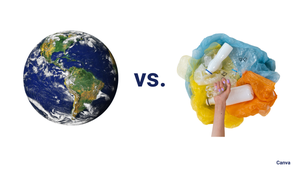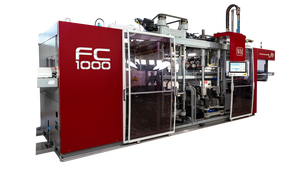July 1, 2003
There may have been few truly new machines displayed by thermoforming machine manufacturers at the Plast exhibition in Milan, Italy in May, but what was clear is that electric drive systems have begun to make their mark. There were, in fact, two electric servomotor-driven units from separate firms. Giovanni Morandi, sales manager at Meico (Monza, Italy), which includes the TFT and W.M. Wrapping Machinery thermoforming businesses, says sales of the FCS 750E, the electric servomotor version of the firm’s established 750 hydraulic machine, are selling well since the prototype was shown at K 2001 in Germany. He does not offer exact sales figures but he does say processors doing frequent, short runs and mold changes have been buyers, lured by the system’s 30-minute, one-employee tool changeover process. “We’ve improved it [since K] and sold quite a few,” he says. The electric version can cut a processor’s energy bill by about 40 percent, he says, and its cycle times on equivalent materials and shapes are faster than the hydraulic version.
The firm sells from 35 to 40 of its hydraulic 750 machines per annum, says Morandi, and last month—for the first time at NPE—Meico division TFT exhibited a machine, a hydraulic 750 running high-impact polystyrene (HIPS) picnic plates. Meico is already active in the U.S. with its blowmolding machinery but Morandi says the firm is making a push into thermoforming there, too, with the intent to open a U.S. office for TFT this year.
One of the few new machines at Plast was the FFG 750, a servomotor-powered unit from manufacturer Amut (Novara, Italy). The offline thermoforming machine includes a preheating oven for processing thick polypropylene (PP) sheet and an integrated grinder for web scrap. At the Plast show it processed multiportion oval PP tubs.
Amut and Meico officials say demand for inline extrusion/thermoforming units continues to grow as more processors choose to extrude their own film. Morandi says Meico does not yet market standalone extrusion units but makes them for customers requesting inline systems. Inline systems are made at the W.M. plant in Stabio, Switzerland.
Emerging markets
Many Southern European processors of drinking cups and picnic plates are now switching from PS to PP, say Morandi and Stefano Cremanesci, marketing manager at thermoforming mold manufacturer Termostampi. PP is already the established material in Northern Europe for such applications, both agree. Termostampi, based in Cernusco, Italy, sells about 80 to 100 molds/yr on average, all for cups, plates, and packaging, with 50 to 60 percent going to Italian processors and the rest shipped globally. Outside Italy he identifies Eastern Europe and Russia as the region where he sees greatest demand growth with Termostampi fielding many requests for quotations, especially for PP yogurt cup and beer cup tools.
New to the European thermoforming machine market—and practically every other Western European machine market—is IMG, a consortium of Chinese, Korean, and Taiwanese manufacturers making thermoforming, injection molding, blowmolding, film and profile extrusion, and tubemaking machinery and equipment, as well as much of the associated auxiliary machinery. “We’re here at Plast to introduce ourselves [to European processors], to show what we have to offer,” says chairman Young-Guk Song at the firm’s massive stand. IMG’s European headquarters is in Warsaw but he says this will shift to Frankfurt, where the firm already has an office. The firm has been active in Poland and Eastern Europe since 1998, he says, with Russia proving its best market. Until now only the blow and injection molding equipment have met CE safety certification, but Song says by next year, when Poland enters the European Union, the rest of the machinery should be certified.
Among the few non-Italian thermoforming machine makers present was Kiefel (Freilassing, Germany). This year the company intends to launch a larger version of its KMV 50, says Kurt Brunner, sales and project engineer. Kiefel first displayed this midpriced machine at K 2001, calling it its answer to competitor Illig’s RV 53B. Another German manufacturer, Geiss Maschinenfabrik (Sesslach, Germany), exhibited its inline system for technical parts, and formed and finished children’s sleds using a new high-temperature-resistant copolyester, Kelvx, from Eastman Chemical.
You May Also Like


